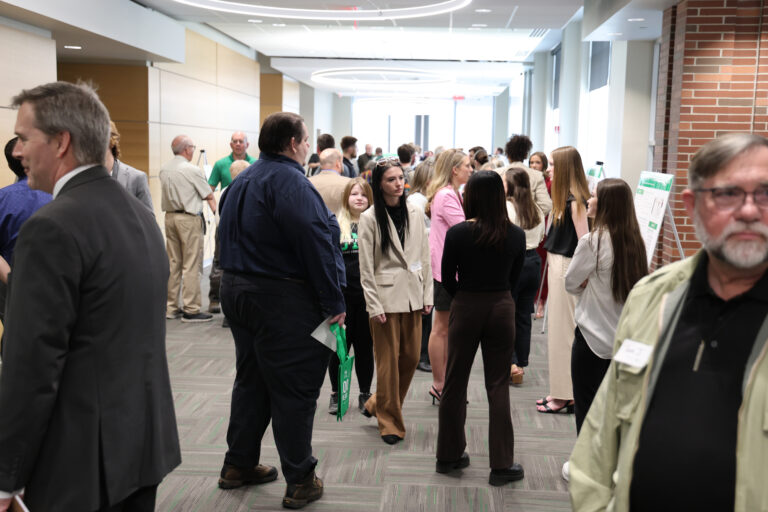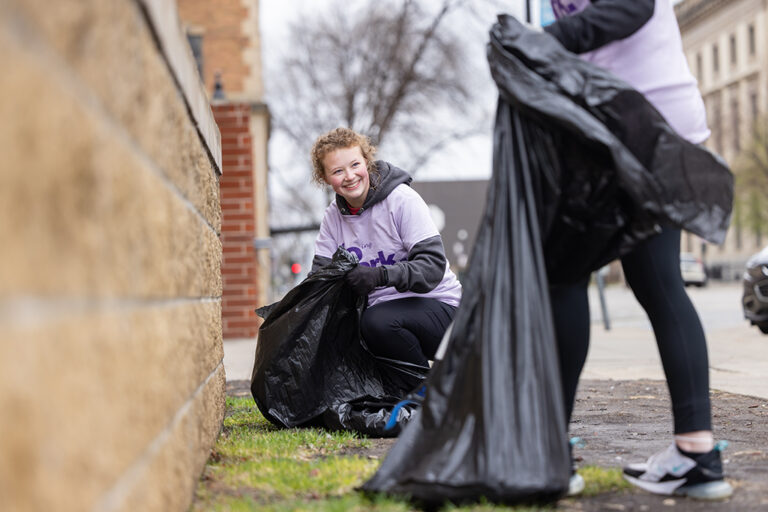Brian Pappas to leaders: ‘Pick up the pepperoni’
Brian Pappas, dean of the UND School of Law, reflects on humility and responsibility in his 18:83 Speaker Series talk

“I don’t believe that leadership is a position, I don’t think it’s a role; I think it’s a value,” said Dean of the UND School of Law Brian Pappas in the first 18:83 Speaker Series speech of 2024.
Pappas laid out his guiding principles for leadership over his 18-minute and 83-second speech, which took place at the bottom of the Memorial Union’s Social Stairs. Drawing on personal experiences and favorite inspirational quotes, he drew a leadership roadmap that proceeds through five guiding principles.
Pappas first addressed what leaders should do to address their flaws. Citing a quote from CrossFit internet personality Chris Spealler, Pappas said he likes to approach his weaknesses by “making friends” with them, examining them closely to tackle them head-on.
He said that, throughout his career, he has had to work to overcome his self-identified shortcomings as a listener. Rather than dismissing his weakness, he picked up techniques from an improv exercise to practice his active listening skills.
It’s through confronting their weaknesses, said Pappas, that leaders genuinely test their mettle.
“To share your weakness is to make yourself vulnerable. To make yourself vulnerable is to show your strength,” Pappas said. “It’s okay to make mistakes. When we avoid our errors –when we’re not aware of them– we can’t fix anything.”
He added, “I think of mistakes as gifts, and we can learn much better from our mistakes than our successes.”
Engaging with weaknesses can be challenging, especially when someone else points them out, and Pappas acknowledges that. People tend to dismiss criticism or take it personally, but he believes there’s an ideal in the middle. It’s in this middle ground that leaders find new ways to grow.
“In leadership, we have to keep our balance and not go to either extreme,” he said. “You have to be accountable, and you have to be resilient. You have to apologize a lot, and you can never retaliate. It’s not personal even when it feels like it might be, and you have to find the core truth of the critique that will help you get better.”

Similarly, Pappas cautioned against leaders treating people differently based on their status within the team, saying that great ideas often come from those with different positions and experiences. For this reason, he tries to cast a wide net when making important decisions and to value input from all team members, regardless of their roles.
“We have to believe in our people,” he said. “We have to let them do their best work because that’s the expertise that they have. Someone’s going to do what our students, our faculty, our staff dream of doing. So why not them?”
Pappas tied these lessons together through a simple anecdote about a pepperoni lying on the stairs of the School of Law building after a pizza party. He’d noticed that it had been lying there each time he walked past, so later in the day, he picked it up.
This led him to reflect on the importance of leading with humility and responsibility.
“I’m not suggesting that we take on other people’s responsibilities. I know technically, you’re not paying me to pick up the pepperoni,” he said. “But in other ways, that’s exactly what I’m paid to do. To create a culture where we care about the details. We’re working hard to support our students, our legal community, our entire state, and positive results can happen for individuals and organizations.”
He continued: “If you want to become a better leader or to become a better person so that you can support everyone: Pick up the pepperoni. But don’t eat it.”
On Wednesday, Jan. 17, the 18:83 Lecture Series will continue with Charles Gorecki, CEO of the EERC.
A video of Pappas’ talk is available below.



